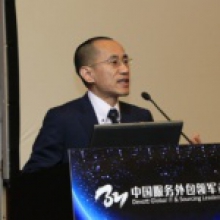Haitao Qi is the CEO and founder of Devott, the leading Chinese research and advisory firm focussed on the country’s technology markets and business services, whose annual Devott Global IT & Sourcing Summit (DGITS) is now the largest of its kind in China. He is a co-founder of the Outsourcing International Operating Protocol (OIOP); an executive director of China Information Technology & Service Alliance (CITSA); a member of and advisor to a number of significant governmental committees and working groups; and was named 2011’s “Influential Man of the Year” by the China Software and Information Service Outsourcing Industry Alliance.
Outsource got together recently with this veritable pillar of China’s outsourcing industry to find out a little more about his organisation; his views on the current state and future potential of Chinese outsourcing; and why he thinks Chinese outsourcing providers could do much better without the “frequent corporate distractions” of their leaders...
Outsource: Thanks so much for taking the time to speak with Outsource today. You’re a big believer in the value of a private-sector advisory organisation working closely with governmental bodies in China: could you explain why you think this combination is so important and why it’s worked so well for your company? And – without getting too deep into political theory! – could you perhaps explain to our readers how the Chinese government is working to expand the private-sector outsourcing space in your country?
Haitao Qi: The Chinese economy in most parts is still centrally controlled and government-regulated, including advanced technologies and R&D programs. Alibaba, Huawei, Tencent demonstrate the significant role private companies could play in China, however their economic impact and market influence on the entire economy remain indecisive to move a trend or change a direction.
For better or worse, this structure serves the fast growth of conventional industries and hardware-centric industries well in China. Nevertheless, the model doesn’t work well in knowledge-focussed and service-centric industries such as IT services and software, the industries establishing the foundation of outsourcing as we know it. If there is a fundamental change, Chinese governments acknowledge the fact faster than before. This creates the foundation of Devott’s business.
With growth as the focal method of keeping society stable, Chinese governments have started to realise the irreplaceable importance of private companies, international firms and third-party independent voices in the areas of disrupting technologies and new economy.
The special role of Devott is to provide Chinese decision-makers and global corporate executives with independent, professional and international viewpoints as a trustworthy local company. This strategic positioning differentiates Devott from hundreds of Chinese companies and organisations as well as international consulting moguls and Fortune 500 corporations. Devott is not a competitor but a partner to all the shareholders of Chinese outsourcing.
The Chinese outsourcing market should be the second largest (in terms of total values) and the fastest growing in the world. However, maturity and growth are under-developed because of the Chinese political structure, outdated policies and short-sighted visions of the Chinese technology companies (some of them appear addicted to governmental supports). Our research indicates the leaderships of Chinese outsourcing companies have something to do with the current less-than-expected status of Chinese outsourcing development.
As a simple comparison, private companies and start-ups began their existence in Chinese outsourcing, telecommunication, e-commerce and internet applications in the middle of the 1990s. After two decades of development under almost the same government policies, regulations and support, China has world-leading companies such as Huawei, ZTE in telco; Alibaba, Tencent in e-commerce; and Baidu, Tencent in internet applications. Unfortunately there is no single Chinese firm in the outsourcing arena significant enough to be competitive in the international market yet.
Devott believes a certain layer of protection or preference is necessary, but competitive capabilities and the business potential of Chinese outsourcing need a more transparent openness to global firms and domestic companies from other provinces. Domestic protection appears to protect local companies but actually hurts their basic surviving capabilities, which eventually becomes a bigger issue than initially.
Besides more open-minded governmental policies, Devott emphasises the nonparallel importance of dedicated, focussed and truly global leadership to the genuine growth of China’s outsourcing companies. Many evidence and testimonials attribute the sluggish progress of Chinese outsourcing, compared to other hi-tech industries, to the quality of Chinese executives.
O: The Devott Global IT and Sourcing Summit (DGITS) is one of the most prominent and largest conferences in the outsourcing space in China. What was the rationale behind the creation of this event and what purposes does it seek to achieve now?
HQ: DGITS is a result of both our customer’s needs and our strategic demand. For years, the executives of our customers from abroad and inside have asked us for recommendations for a national summit where professional opinions and global viewpoints are showcased more than other “official” forms and “official” appearances. These recommendations are getting harder with less popular outcomes of various national events held in different Chinese cities by different organisations. We believed an event we had direct control over could produce the results consistent with our customers’ expectations. This is why we started to hold our first DGITS four years ago.
As a globally leading company on the Chinese technology and service market, we also need an annual event where our major customers, partners and providers can meet and talk in person. DGITS is developed for this critical purpose as well. The demand is demonstrated well in the events of NASSCOM and Gartner, our global partners.
O: Among many other titles on an impressive resume, you’re a co-founder of the Outsourcing International Operating Protocol. Could you explain what this is and how it works?
HQ: OIOP is a component of MVSS (Multiple Dimensional Vendor Selection System) now. Cooperating with global leaders in research and education, Devott develops the world’s latest data-driven, analytics-centric assessment system of outsourcing locations (including tech parks in China) and service providers. There are three levels and six dimensions of the assessment procedures catering to the three levels of the decision-makers in outsourcing deals and major components of the assessments specific to Chinese cities and companies. There are 160+ assessment indexes of MVSS including financial creditability, market stability and total local incentives, which surpass existing similar assessment methodologies.
The result of the MVSS is an integrated calculation rank – CCI (Competency and Compatibility Index) – to specific outsourcing projects or buyers who consider not only professional experience and skills but also industry knowledge, entire costs and management risks. The CCI rank could be different for outsourcing projects requiring different industry expertise, maturity levels, local support and risk-tolerance scope. This is a system where global outsourcing buyers and Chinese outsourcing providers, cities and tech parks can communicate in the same language defined by the same benchmarks, milestones and terminology.
O: You’re also a member of a couple of committees within the Chinese government: for those readers who aren’t familiar with the state sector in China could you explain your roles here?
HQ: These committees are brainpower organisations or industrial service organisations established by various government sectors for outsourcing or related industries. For instance, there are Talent Alliance, Industrial Organisation, Strategic Committee, etc; all of them are organisations established by different government branches in charge of different industries. Devott is a primary advisory firm to provide professional and trend advice.
The value of Devott to Chinese governments – from central, provinces, cities to technology parks – can be shown in our advice to them on: the global market; domestic markets; investment and incentive policies; industry development growth and budget arrangements; and risk detection and mitigation methods.
O: The Chinese outsourcing industry tends to be viewed by many in the west as overwhelmingly focussed on ITO. Is this a fair assessment? What are the prospects for the country’s BPO industry, in your opinion, over the next few years?
HQ: Except a few countries such as the Philippines and Puerto Rico, ITO is a larger component of the outsourcing industry not only in China but also in the majority of developing countries. The development of Chinese service providers began from IT technical services, and with the accumulation of experience and capability enhancement, they began to provide customers with other types of service such as BPO and KPO.
Based on our research, BPO will lead the growth of the Chinese outsourcing industry in the next five to ten years. The reason is simple: the largest market of consumers needs a global-scale BPO to support. Over 62% of projects with which we have been helping our international clients over the last 12 months were focusing on BPO, while BPO is considered to contribute only 22% of Chinese outsourcing business. It’s also our research that KPO as defined in a general sense should be the strongest hold among Chinese ITO, BPO and KPO. The justification is that most Chinese technology exports should be counted as KPO. For example, Chinese mobile device manufacturers and OEM companies complete work much more than simple assembly of device components. WTO counts all the assemblies as Chinese exports in its standard business databases. If this argument is valid, then KPO’s size should be larger than ITO and BPO combined in China.
O: There’s also often the perception that China’s outsourcers are set up primarily to cater for the domestic market (which is of course a huge one!). This is not, of course, necessarily the case – but how do organisations such as yours work to counter that perception?
HQ: On the contrary, China’s service providers started their business from offshore markets, and then served the domestic market after their resources and capabilities expanded. A fact to share: Chinese governments gave global companies so many deals that the Chinese companies asked for equal opportunities when bidding for governmental projects in the 1990s. The reason international organisations have the “domestic market preference” perception may come from the confusion of development timelines and benchmarks. For instance, most Indian service providers started their businesses via their deals from the US, and made the delivery in India.
Meanwhile China itself is a large economy, so a large number of multinational enterprises entered into China to establish their own branches much earlier and much more than other emerging markets. Chinese outsourcing companies got their global business from multinational enterprises branched in China already. From some perspectives, Chinese sourcing companies did serve their own market first, but the buyers are actually MNCs headquartered outside of China.
From the data we collected in the early 2000s, we found that like the Chinese manufacturing the core driving force of Chinese outsourcing industries come from offshore. Like Pactera (even if delisted) and Beyondsoft, they all set up overseas branches, conducted mergers and acquisitions, after the practice of their overseas service capabilities, and then began to provide services for domestic enterprises.
The Chinese economy is exposed to the global market probably more than most developed countries. One of our latest arguments to the Chinese government is that opening up the domestic market actually enhances the stability of the domestic economy, employment and society. This is a novel argument, but receives keen responses.
O: Where do you see Devott’s growth coming from (in terms of geographies and industry verticals) over the next three to five years? Do you have any ambitions to become a bigger name in Europe, for example?
HQ: Firstly, more business from global companies – because of the combination of the heavier weight of Chinese market plus the slowing-down of the global economy. Few other countries hold the same weight as China even though there are many defects in it.
Secondly, advanced services from the development of the MVSS system, from advisory, research and data. This could be the cornerstone of our extended services in both China and the international market. This direction of new business could be interpreted as stronger business when global buyers gain more confidence and control after understanding the advantages and disadvantages of Chinese companies more, and adopt more capable risk-control measures advised by this BI-based methodology. We believe the confidence of the buyers is more important than the marketing/sales in this business.
Thirdly, more attention to other developing markets such as Latin America, Eastern Europe and Southeast Asia. The brand influence and market impact of Devott in these emerging markets is top-class even compared to the global consulting moguls.
It’s Devott’s belief that Europe is a crucial part of the global outsourcing community. It’s also an accurate statement that few Chinese companies and governmental organisation do well, or even accept jobs there, truth be told. This is why Devott is committed to the relationship with SIG/Outsource, with the strong expectation SIG could help Devott’s customers more in this important market.
O: What do you see as being the biggest challenges to those ambitions – and to the ongoing expansion of the Chinese outsourcing industry generally?
HQ: Stopping opening outsourcing markets, because of seemingly justified purposes from politics or the macro-economy; stopping listening to the independent, professional advisories. The frequent distractions of Chinese corporate leadership. Lack of high-level HR. And using Chinese-style marketing to do global business
O: You mentioned SIG and Outsource, there, and indeed we’ve come into contact thanks to your involvement with SIG, so perhaps we should look briefly at that: how did you come to connect with SIG and what are your intentions for that partnership going forwards?
HQ: Partnering with globally influential organisations is critical for Devott and Devott’s customers inside China and abroad. Up to now, we are proud Devott/CITSA is one of the few global companies with close cooperation with organisations in most important countries and regions in the global outsourcing community: Latin America, Europe, North America, Africa, Russia/East Russia, East Asia, and South-East Asia – and the outsourcing superpower India.
We have specifically shared our expectation of SIG in both the US and the EU. For the time being, SIG events and SIG University are the two primary cooperating areas. We want our customers to use SIG’s services more – especially the Summits and IT education because we believe they are the best in the industry.
O: What do you think will be the big game-changing technologies of the next few years and how are you positioning Devott to make the most of them?
BI (business intelligence): outsourcing deals are guided and managed by best practices and case studies operated in a self-guided software system. AI and VR (Artificial Intelligence and Virtual Reality) – outsourcing projects are completed by robots, instead of human beings. And the mobile internet: more competitors from currently unavailable regions or countries, and stronger competition from currently weak countries.
As for our strategies: all the advanced technologies bring challenges and uncertainties to our customers, so we have to prepare our knowledge base and experts before our customers. We will partner with more global leaders in technology areas and the frequency of technology knowledge sharing needs to be increased. Thirdly, we must expand our IP protected system or methodology such as MVSS so it could apply in the new era of BI-AI-mobile internet.
O: Finally, what are the most important lessons you’ve learnt during your career – and what would be the best advice you could give to someone looking to emulate your success?
HQ: The important lessons I value most are: in-depth understanding of the “pains” the current customers have; understanding the unique values we can provide to reduce those “pains” without causing more “pains”; and being persistent once a goal is set.
The best advice I’d like to share is to focus on what you love and what you do the best: no compromises and no conditions.








